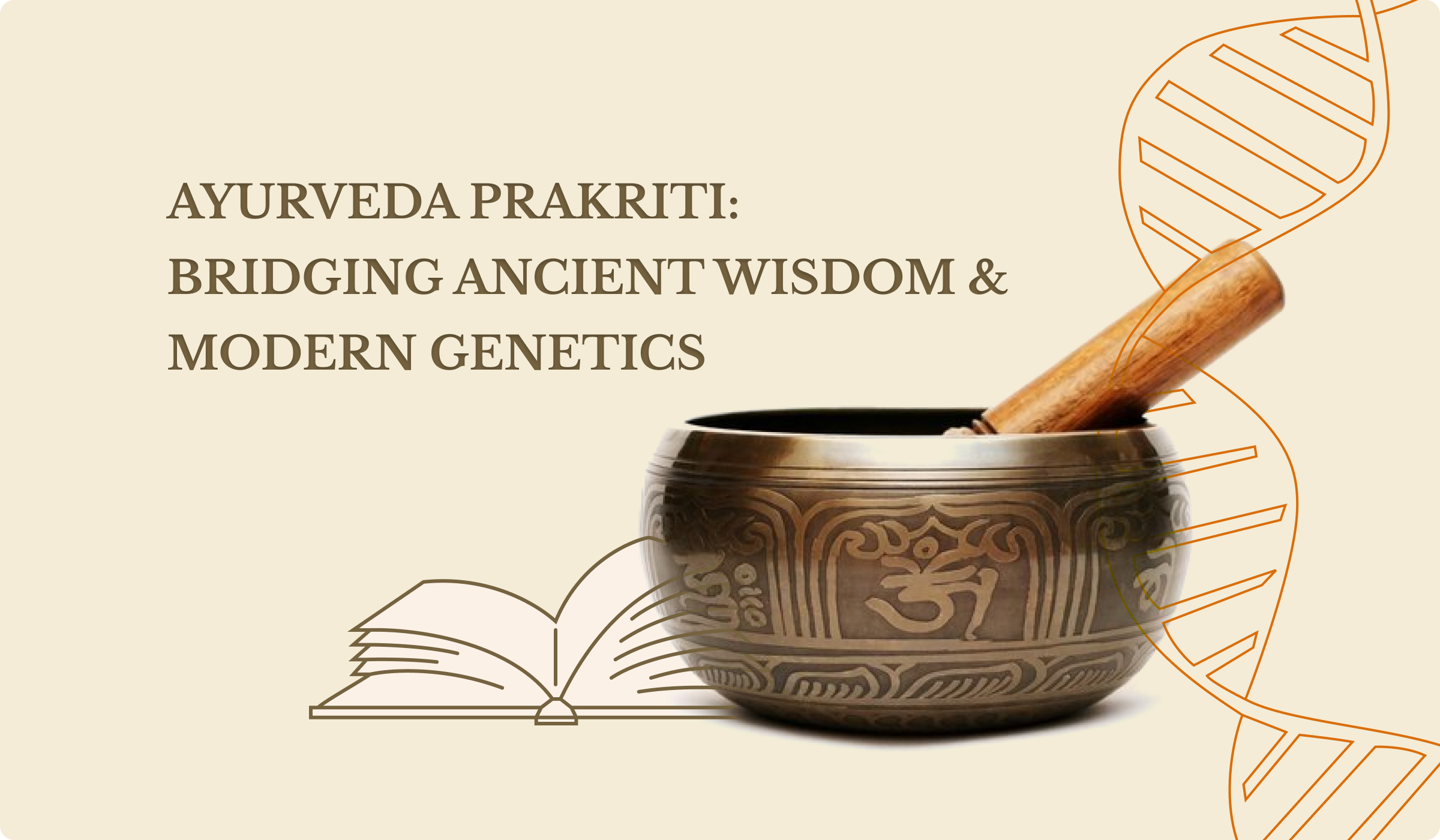Ayurveda Prakriti: Bridging Ancient Wisdom and Modern Genetics

Mental Wellness | Ayur AI
Dr. Prathiban R B.A.M.S., MSc, Ph.D
Updated on August 31, 2024
Ayurveda, one of the world's oldest systems of medicine, has been practiced in India for over 3,000 years. At its core, Ayurveda emphasizes balance and harmony between the body, mind, and spirit. A fundamental concept in Ayurveda is *Prakriti, which refers to an individual's unique constitution or body type. According to Ayurveda, every person is born with a specific Prakriti, determined by the balance of three **doshas—Vata, **Pitta, and **Kapha*. These doshas govern various physiological and psychological functions in the body, and understanding one's Prakriti is essential for maintaining health and preventing disease.
Recent scientific research has begun to explore the genetic basis of Ayurvedic Prakriti, shedding light on how this ancient concept aligns with modern genomics. A groundbreaking study titled *"Genome-wide analysis correlates Ayurveda Prakriti"* (published in Scientific Reports in 2015) has provided compelling evidence that Prakriti classifications may have a genetic foundation. This study represents a significant step toward integrating traditional Ayurvedic knowledge with contemporary scientific research.

What is Prakriti?

.png)
-
In Ayurveda, Prakriti is determined by the dominant dosha in an individual, which influences their physical, physiological, and psychological traits. The three doshas are:
- Vata:Associated with movement, creativity, and flexibility.
Vata-dominant individuals are often thin, energetic, and prone to anxiety and digestive
issues.
- Pitta: Linked to metabolism, digestion, and energy production.
Pitta-dominant individuals tend to have a medium build, sharp intellect, and a tendency
toward irritability and inflammation.
- Kapha: Governs structure, stability, and lubrication. Kapha-dominant
individuals are usually strong, calm, and prone to weight gain and sluggishness.
Prakriti is assessed through a detailed evaluation of physical characteristics, behavior, and health tendencies. Ayurvedic practitioners use this information to tailor treatments, diets, and lifestyle recommendations to an individual's unique constitution.

The Study: Linking Prakriti to Genetics

.png)
The 2015 study aimed to investigate whether the Ayurvedic concept of Prakriti has a genetic basis. Researchers conducted a *genome-wide analysis* of 262 healthy male individuals classified into Vata, Pitta, and Kapha Prakriti types. Using advanced genetic tools, they identified *52 significant single nucleotide polymorphisms (SNPs)* that distinguished the three Prakriti types. These genetic markers were found to be independent of ancestry or population stratification, suggesting that Prakriti classifications are rooted in genetic differences.
- Key Findings:
- Genetic Markers for Prakriti: The study identified 52 SNPs that were significantly associated with Vata, Pitta, and Kapha Prakriti types. These genetic variations were able to classify individuals into their respective Prakriti groups with high accuracy.
- PGM1 Gene and Pitta Prakriti: One of the most notable findings was the association between the **PGM1 gene* and the Pitta Prakriti. The PGM1 gene plays a crucial role in metabolic pathways, including glycolysis and gluconeogenesis. This aligns with the Ayurvedic description of Pitta as being responsible for digestion and energy production. The study found that specific genetic variants in the PGM1 gene were more common in Pitta-dominant individuals, suggesting a genetic basis for their metabolic traits.
- Population Stratification Control: The researchers carefully controlled for population stratification, ensuring that the observed genetic differences were not due to ethnic or ancestral variations. This strengthens the validity of the findings and supports the idea that Prakriti classifications are genetically distinct.
- Statistical Model for Prakriti Classification: The study developed a statistical model to classify individuals into Prakriti types based on their genetic markers. This model was validated on a broader Indian population, demonstrating its potential for widespread application.

Implications of the Study

- Personalized Medicine:The findings suggest that Prakriti-based classifications could be used to tailor medical treatments, diets, and lifestyle interventions to an individual's genetic makeup. This aligns with the growing field of personalized medicine, which aims to provide customized healthcare based on genetic, environmental, and lifestyle factors.
- Validation of Ayurveda:The study lends credibility to Ayurvedic practices by demonstrating that Prakriti classifications are not merely subjective but have a genetic basis. This could encourage further research into other Ayurvedic concepts and their potential applications in modern healthcare.
- Bridging Traditional and Modern Medicine:By combining ancient Ayurvedic wisdom with cutting-edge genomic research, this study opens up new possibilities for integrating traditional and modern medical systems. It highlights the potential for Ayurveda to contribute to global healthcare in a scientifically validated manner.
- Investigate the genetic basis of Prakriti in larger and more diverse populations, including women and individuals from different ethnic backgrounds.
- Explore the functional roles of the identified genetic markers and their impact on health and disease.
- Develop Prakriti-based diagnostic tools and therapeutic interventions that integrate Ayurvedic principles with modern medical practices.
This study represents a significant milestone in the integration of Ayurveda and modern science. By identifying genetic markers associated with Prakriti, the research provides a scientific basis for the ancient Ayurvedic concept of individualized medicine. Here are some key implications:

Future Directions


Conclusion

Develop Prakriti-based diagnostic tools and therapeutic interventions that integrate Ayurvedic principles with modern medical practices.
As we continue to explore the intersection of Ayurveda and genomics, we may uncover even deeper insights into the intricate relationship between our genes, our health, and our unique constitutions. This study is a testament to the enduring relevance of Ayurveda and its potential to contribute to the future of medicine.




